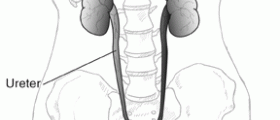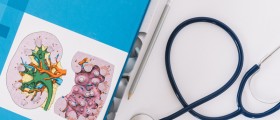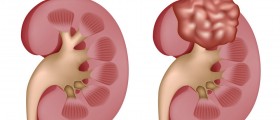
Kidneys are a pair of organs that have a vital role in the body functioning. Kidneys are located on the each side of the spine in the lower back and they are connected to the urinary bladder by tubes called ureters. The main function of the kidneys is to filter blood by removing waste products and excess water that will be eliminated with the urine. Another function of the kidneys is to regulate levels of minerals such as sodium, potassium, and calcium in the blood.
Kidney disease is characterized by gradual and in most cases permanent loss of kidney function. Loss of kidney function entails accumulation of water, waste and toxins in the body. This condition may lead to anemia, hypertension, disorders related to cholesterol and fatty acids, bone disease and acidosis or excessive acidity of body fluids. Kidney disease develops slowly and it is divided into five stages of increasing severity. Many people with kidney disease are not aware of their condition because the signs and symptoms can be very subtle. It can take several years to realize that a person suffers from kidney disease. There are different symptoms of kidney disease but they may also indicate some other illnesses thus only way to be sure is to see a doctor. This involves blood creatinine test that presents glomerular filtration rate or GFR level that measures how well the kidneys are filtering the blood.
Stages
The first stage of kidney disease refers to slight kidney damage. Blood creatinine test in this stage shows GFR to be between 90 and 100. In the first stage of kidney disease, affected person usually doesn’t experience any symptoms.
The second stage of kidney disease features GFR between 60 and 89. This stage also usually doesn’t cause the symptoms though a person may have foamy urine which indicates a protein in the urine.
The third stage, a person with kidney disease commonly has to get up at night to urinate more often than usual. Affected person may also feel extremely fatigued and there may be some other signs of anemia. Leg cramps and very itchy dry skin due to build up of wastes commonly accompanies the third stage of kidney disease. GFR level is 60 and below.
The fourth stage represents severe decrease in kidney function. This stage is characterized by less often urination because of fluid retention that is followed by swelling and edema. In this stage, the sufferer must eat special diet with restricted amounts of sodium, potassium and phosphorus. The GFR rate is commonly between 15 and 29.
The fifth stage of kidney disease is actually kidney failure. The symptoms include extreme swelling, nausea and vomiting, and making little or no urine. The kidneys are unable to filter blood and only way for patient to survive is to have dialysis. Kidney transplant is another option for people with kidney disease stage five.

















Your thoughts on this
Loading...